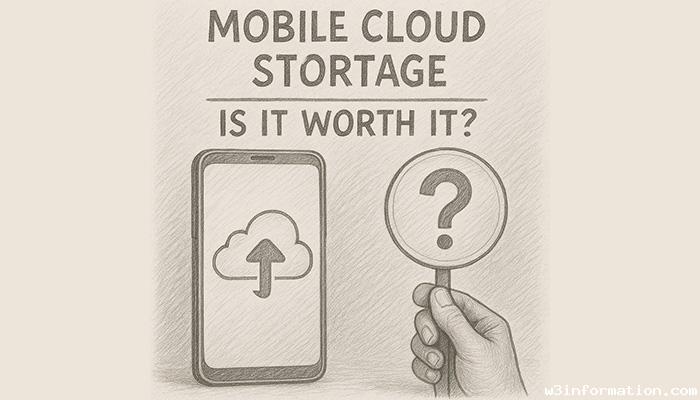Mobile Cloud Storage: Is it Worth it?
The growing integration of smartphones into everyday life results in a rising demand for larger storage capacities. Our mobile devices store an ever-growing amount of data from photos and videos to documents and apps. Despite built-in storage options in most devices many users have started to explore cloud storage solutions to meet their growing space requirements. By uploading your files to remote servers through mobile cloud storage you can reclaim space on your device. But is it worth it? This blog examines both the advantages and disadvantages of mobile cloud storage to assist you in determining whether it meets your requirements.
What is Mobile Cloud Storage?
Mobile cloud storage is an online storage service enabling users to store their data and files on remote servers instead of their personal device's built-in storage. Users can access their data through internet-enabled devices which allows them to seamlessly share and sync information across platforms like smartphones, tablets, and laptops.
Popular mobile cloud storage services include:
- Google Drive
- Apple iCloud
- Dropbox
- Microsoft OneDrive
- Amazon Drive

Key Benefits of Mobile Cloud Storage
a. Increased Storage Capacity
Cloud storage provides the essential benefit of extending your device storage capacity. By transferring large files to cloud storage you gain the ability to access your photos, apps, or videos whenever needed without worrying about running out of device space.
- Move big files (such as photos and videos) to cloud storage to free up space on your device.
- You can expand your storage capacity via paid subscription plans while retaining your current device.
b. Easy Access and Syncing Across Devices
With cloud storage you can store files in a single location and retrieve them from any device. File synchronization across smartphones, tablets, laptops, and desktops becomes straightforward with this system while keeping your data accessible whenever necessary.
- You can view documents and media files while editing them and share them between devices with ease.
- Your photos, videos and documents will be automatically synchronized across all connected devices.
c. Data Backup and Recovery
Mobile cloud storage functions as an offsite backup solution which keeps your data secure against device malfunctions or theft or accidental loss.
- Protect essential information including photos, contacts, and files through backups to protect against device failure or theft.
- Cloud services provide tools such as versioning and recovery options to enable access to previous file versions.
d. Enhanced Sharing and Collaboration
Using cloud storage makes it easy to share files and work together with others. With cloud storage services you can distribute work documents, family photos or videos by providing a link or setting particular access permissions.
- You can distribute files conveniently to friends, family members, and work colleagues.
- Google Drive and OneDrive enable real-time collaboration on documents, spreadsheets, and presentations.
Challenges of Mobile Cloud Storage a
a. Dependence on Internet Connectivity
Accessing files in cloud storage requires a stable internet connection to support upload and download processes. Access to your data becomes impossible without Wi-Fi or cellular data.
- Files experience delays when uploading and downloading through limited or slow internet connections.
- Files saved in cloud storage become inaccessible during network outages if they do not have offline access capabilities.
b. Security Concerns
Although cloud storage companies use strong encryption and security measures their implementation of third-party servers still poses security risks for personal data storage. All organizations must constantly guard against potential breaches together with data leaks and unauthorized access attempts.
- Select a cloud provider that maintains robust security protocols such as end-to-end encryption.
- Guard against phishing attempts and avoid using insecure sharing links while strengthening your passwords.
c. Costs and Storage Limits
Cloud services provide free storage options but restrict them to minimal amounts such as Google Drive's 15GB limit. Users needing more storage space must choose premium plans which will accumulate costs over time.
- The cost of paid plans changes based on storage needs while still possibly lacking in terms of flexibility and price competitiveness.
- Users often encounter unnecessary expenses when they pay for cloud storage without taking full advantage of the available space.
d. Data Privacy and Ownership
Cloud storage companies retain access rights to all user data stored on their servers. Although most companies claim they will not misuse your data, data ownership and privacy issues continue to raise concerns among users.
- Reading the terms and conditions reveals what access rights the cloud provider possesses to your stored files.
- Make sure you are fully comfortable with how the provider handles privacy policy before you upload sensitive data.
Is Mobile Cloud Storage Worth It?
Your requirements and how you use cloud storage determine the answer to this question. Here are some considerations:
For Users with Large Media Files
Anyone who frequently captures photos and videos or holds large media files on their mobile device needs cloud storage to manage their data. Cloud storage allows you to increase your device capacity while maintaining an organized file system and retaining access to essential files.
For Users with Limited Storage Needs
People who seldom need more storage space on their mobile device and who store only a small number of files may not require cloud storage solutions because additional storage plans come at an extra cost.
For Professionals or Collaborative Teams
Professionals benefit greatly from cloud storage as it enables them to store and access files from multiple devices while facilitating collaborative work. Many businesses and individuals find cloud storage indispensable because it allows real-time collaboration and secure sharing together with straightforward backup solutions.
For Backup and Disaster Recovery
Protecting your data from loss or damage requires essential cloud storage. Reliable backup solutions provide the certainty that your vital files will remain accessible following any unexpected problems.
Best Cloud Storage Options
The following list showcases the leading mobile cloud storage providers.
- Google Drive: Android users will find Google Drive highly functional due to its integration with Google productivity apps and it provides users with 15GB of free storage.
- Apple iCloud: Apple device owners benefit from iCloud's seamless macOS and iOS integration along with 5GB of free storage.
- Dropbox: Dropbox stands out as a preferred solution for sharing files and teamwork while providing users with 2GB free storage alongside budget-friendly subscription options.
- OneDrive: OneDrive provides an excellent experience for Windows users through integration with Office applications and a free storage limit of 5GB.
- Amazon Drive: Amazon users benefit most from this service because it provides 5GB free storage space along with very accommodating plans dedicated to photos and videos storage.
Conclusion
Mobile cloud storage systems deliver undeniable convenience with multiple benefits such as increased storage capabilities and dependable backup options while providing access to files on multiple devices. Cloud storage systems require a stable internet connection and present security risks while demanding payment for increased storage space. The advantages of cloud storage usually surpass its disadvantages for most users who handle large media files often require straightforward file sharing or desire secure data protection. Your storage requirements, privacy concerns and budget limitations will determine your decision.
 DIY Holiday Decor Ideas on a Budget
DIY Holiday Decor Ideas on a Budget
 How to Create a Healthy Meal Plan for the Week
How to Create a Healthy Meal Plan for the Week
 Discover your top 10 comforting meals to enjoy during the winter season
Discover your top 10 comforting meals to enjoy during the winter season
 Tips for Stress-Free Holiday Travel
Tips for Stress-Free Holiday Travel
 Mobile Video Editing Apps to Try
Mobile Video Editing Apps to Try
 Mobile Health Apps: Best of 2025
Mobile Health Apps: Best of 2025